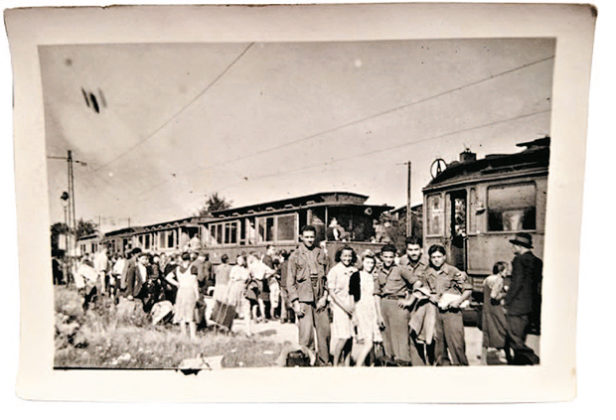- FOKION AVGERINOS – DR. IKE: Athletic Director, Youth Mentor, and Healer
- American Hellenic Institute’s Golden Jubilee Celebration
- Leadership 100 Concludes 33rd Annual Conference in Naples, Florida
- Louie Psihoyos latest doc-series shocks the medical community The Oscar–winning director talks to NEO
- Meet Sam Vartholomeos: Greek-American actor
“I complement the memory of the world…” Greek DPs and POWs in Nazi and fascist concentration camps and prisons
 Seventy five years have passed since the unconditional German surrender which ended WWII in Europe. Seventy five years have also passed since the delayed liberation of many thousands of Greeks who did not celebrate the Nazi withdrawal from their homeland with their compatriots in autumn 1944, as they had been violently deported during the Greek-Italian war and during the triple (German-Italian-Bulgarian) occupation of Greece (1941-1944). A new book, “I complement the memory of the world…” Greek DPs and POWs in Nazi and fascist concentration camps and prisons published in Greece by Annita P. Panaretou, Ph.D, examines this unexplored aspect of modern Greek and world history and it is based on 9,500 pages of testimonies by Greek POWs (military, navy, airforce), women, clergymen, and Greeks with British citizenship. Many of them were arrested in Italy (after the country’s capitulation) by the Nazis and sent to Poland and then to Germany. Greek Jews are not included since their case differs in many ways.
Seventy five years have passed since the unconditional German surrender which ended WWII in Europe. Seventy five years have also passed since the delayed liberation of many thousands of Greeks who did not celebrate the Nazi withdrawal from their homeland with their compatriots in autumn 1944, as they had been violently deported during the Greek-Italian war and during the triple (German-Italian-Bulgarian) occupation of Greece (1941-1944). A new book, “I complement the memory of the world…” Greek DPs and POWs in Nazi and fascist concentration camps and prisons published in Greece by Annita P. Panaretou, Ph.D, examines this unexplored aspect of modern Greek and world history and it is based on 9,500 pages of testimonies by Greek POWs (military, navy, airforce), women, clergymen, and Greeks with British citizenship. Many of them were arrested in Italy (after the country’s capitulation) by the Nazis and sent to Poland and then to Germany. Greek Jews are not included since their case differs in many ways.

Dr. Annita P. Panaretou. PHOTO: NIKOS KOKKALIAS
Some of them were arrested in the Albanian front; most of them were arrested later, because either of their participation in the Resistance or their leftist ideas and very often because they were needed – together with millions of other Europeans – to work for the Third Reich to win the war. After incredible sufferings, a few of those who managed to survive and return to Greece wrote about their experience in detail.
Men and women civilians, military, clergymen in concentration camps and prisons in Germany, Italy, Austria, Serbia, Poland, left shattering texts, reflecting a reality that exceeds imagination: the dramatic everyday life of hunger, illness, maltreatment, exhausting labor, confrontation with death, extreme psychological ordeal; the unique experience of the fascist and Nazi collapse; the liberation by the Allies and the “odyssey” of repatriation, which lasted for months as they had to wander through a chaotic Europe, before being awkwardly and unpleasantly “welcomed” by an unprepared and disintegrated Greek State, that had just left behind the destructive German Occupation and the bloody civil conflict of December 1944.

After the liberation and before the long odyssey of repatriation began
A most interesting and moving detail involves Greek-American soldiers and officers serving in the U.S. Army in Europe. Many of them were among the liberators of major concentration camps. Being second generation emigrants or, more precisely, children of Greek emigrants, they were anxious to trace imprisoned compatriots and took care of them whenever they found them.
It is not difficult to imagine how the Greek prisoners of Ebensee (a big subcamp of Mauthausen) felt, when they heard the American soldier who appeared out of the turret of the huge tank that marched through the opened gate, shouting in fluent Greek: ‘Greeks, are there any Greeks here?’
No wonder why the Greek detainees, deeply touched and full of admiration and pride, describe them as giants and heroes. It is not difficult to imagine how the Greek prisoners of Ebensee (a big subcamp of Mauthausen) felt, when they heard the American soldier who appeared out of the turret of the huge tank that marched through the opened gate, shouting in fluent Greek: “Greeks, are there any Greeks here?”
The number that replaced identity, hunger, cold, lice, exhausting labour, allied bombardments, the dilemma of escaping, ways to stay alive are some of the parameters examined in the book as the need for God, the remarkable role of smoking, the supressed libido, the psychological impacts, the human “mosaic” and the relations between the Greeks and their fellow prisoners (Greek compatriots, Russians, Italians, British, Jews etc) as well as the camp and prison staff and the natives outside the camps. Also the Greek human mosaic (political disputes among the Greeks, free will Greek workers in the Third Reich), experiencing the Third Reich collapse (the behaviour of the Nazis, the food and supply shortage, the refugee flows from the East etc), Greek women in Nazi camps and prisons, the long crucial period between liberation and repatriation, with endless wanderings in the chaotic European “landscape”.











0 comments